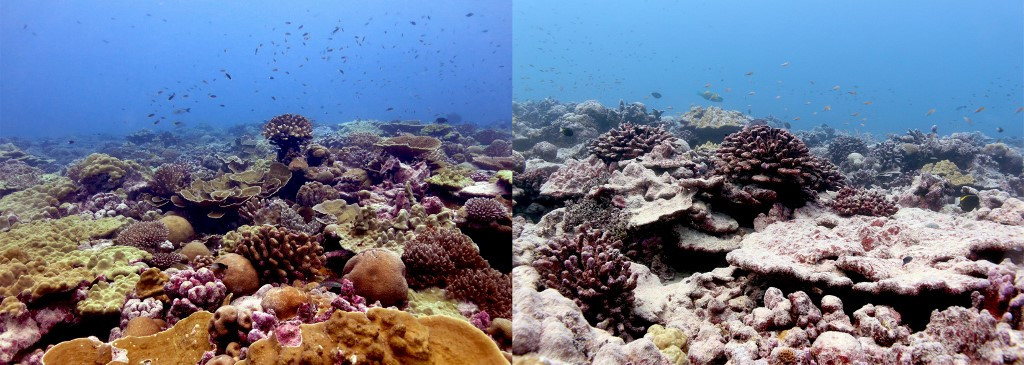Popular Reads
Top Results
Can't find what you're looking for?
View all search resultsPopular Reads
Top Results
Can't find what you're looking for?
View all search resultsCorals can bounce back from bleaching, if humans don't ruin it: Study
Change text size
Gift Premium Articles
to Anyone
 A handout combination of pictures released on December 8, 2020 by Marine Ecology and Conservation section of the biology department at the University of Victoria shows a comparison between two views of the same coral reef on Kiritimati (or Christmas Island coral atoll in the northern Line Islands part of the Republic of Kiribati) photographed before and after the marine heatwave and strong 2015/2016 El Nino: in May 2015 (left), and in June 2018 (right). (VICTORIA UNIVERSITY/AFP/Danielle Claar, Kevin Bruce)
A handout combination of pictures released on December 8, 2020 by Marine Ecology and Conservation section of the biology department at the University of Victoria shows a comparison between two views of the same coral reef on Kiritimati (or Christmas Island coral atoll in the northern Line Islands part of the Republic of Kiribati) photographed before and after the marine heatwave and strong 2015/2016 El Nino: in May 2015 (left), and in June 2018 (right). (VICTORIA UNIVERSITY/AFP/Danielle Claar, Kevin Bruce)
S
ome corals can recover from bleaching even in long heatwaves as long as humans don't interfere, scientists said Tuesday, raising hopes for the endangered underwater ecosystems essential to much marine life.
Researchers tracked corals of the Kiritimati atoll in the Pacific Ocean through the longest tropical heatwave on record, expecting the reefs to suffer mass bleaching.
But despite sitting in a "hot water bath" for 10 months due to a particularly strong 2015/2016 El Nino, the studied corals survived.
"We were blown away... to find that not only were all the corals not dead! But some of them didn't even look to be in bad shape or bleached," said Julia Baum, co-author of the study published in Nature Communications.
"They had recovered while still under these stressful conditions!" the biology professor at Canadian Victoria University told AFP.
However, there is a catch. Only the corals undisturbed by human stress factors such as water pollution were more likely to survive the heatwave.
"We found that corals were only able to recover from bleaching while at elevated temperatures if they were not also exposed to other strong local stressors," Baum said.
Coral reefs cover less than one percent of the ocean floor but support a quarter of marine species, providing them with food and shelter.
Read also: Australian scientists find huge new healthy coral reef off northern coast
Warming waters due to climate change cause corals to expel the food-producing algae living in their tissues, breaking down their symbiotic relationship and leading to loss of color and life in the process known as bleaching.
Recent spikes in tropical and sub-tropical sea surface temperatures, magnified by an especially potent El Nino, have triggered an unprecedented mass bleaching of corals, affecting 75 percent of global reefs.
The Intergovernmental Panel on Climate Change in 2018 issued its landmark report on the Paris deal temperature goals -- "well below" two degrees Celsius (3.6 Fahrenheit) above pre-industrial levels and a cap of 1.5C if at all possible.
It found that at 1.5C hotter, more than 70 percent of Earth's coral reefs will likely die off. At 2C, that increases to 99 percent.
But the discovery that certain types of corals can recover from being exposed to long heatwaves offers a "glimmer of hope" for the rich marine ecosystem, the authors said in the study.
The results show local protection strategies can have an impact on saving the corals, providing incentive to continue efforts to protect reefs.
"If we are to save these magnificent ecosystems overall, the world must get climate change under control," said Baum.
"But this new discovery... might buy some corals a bit of time under climate change."










